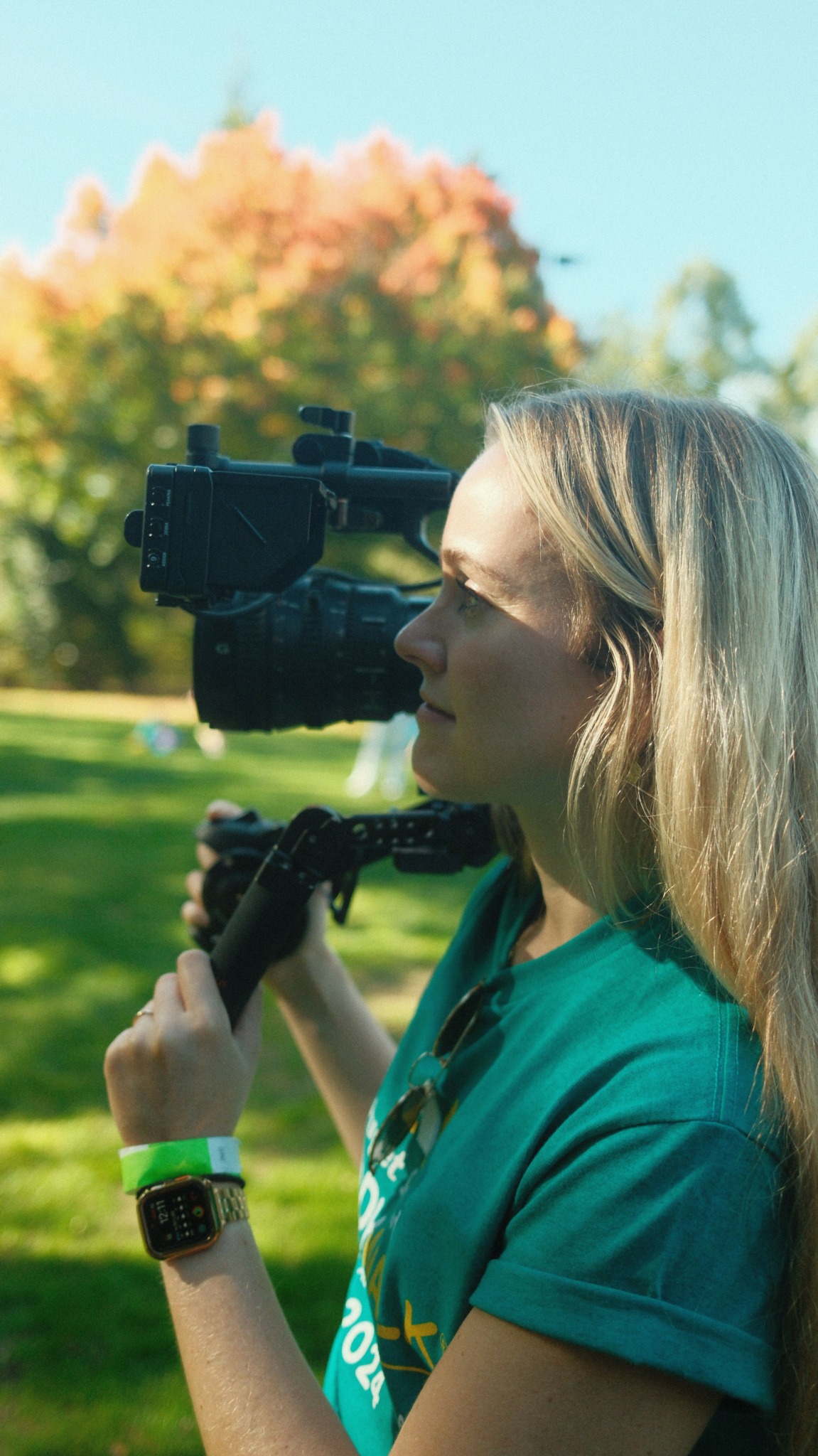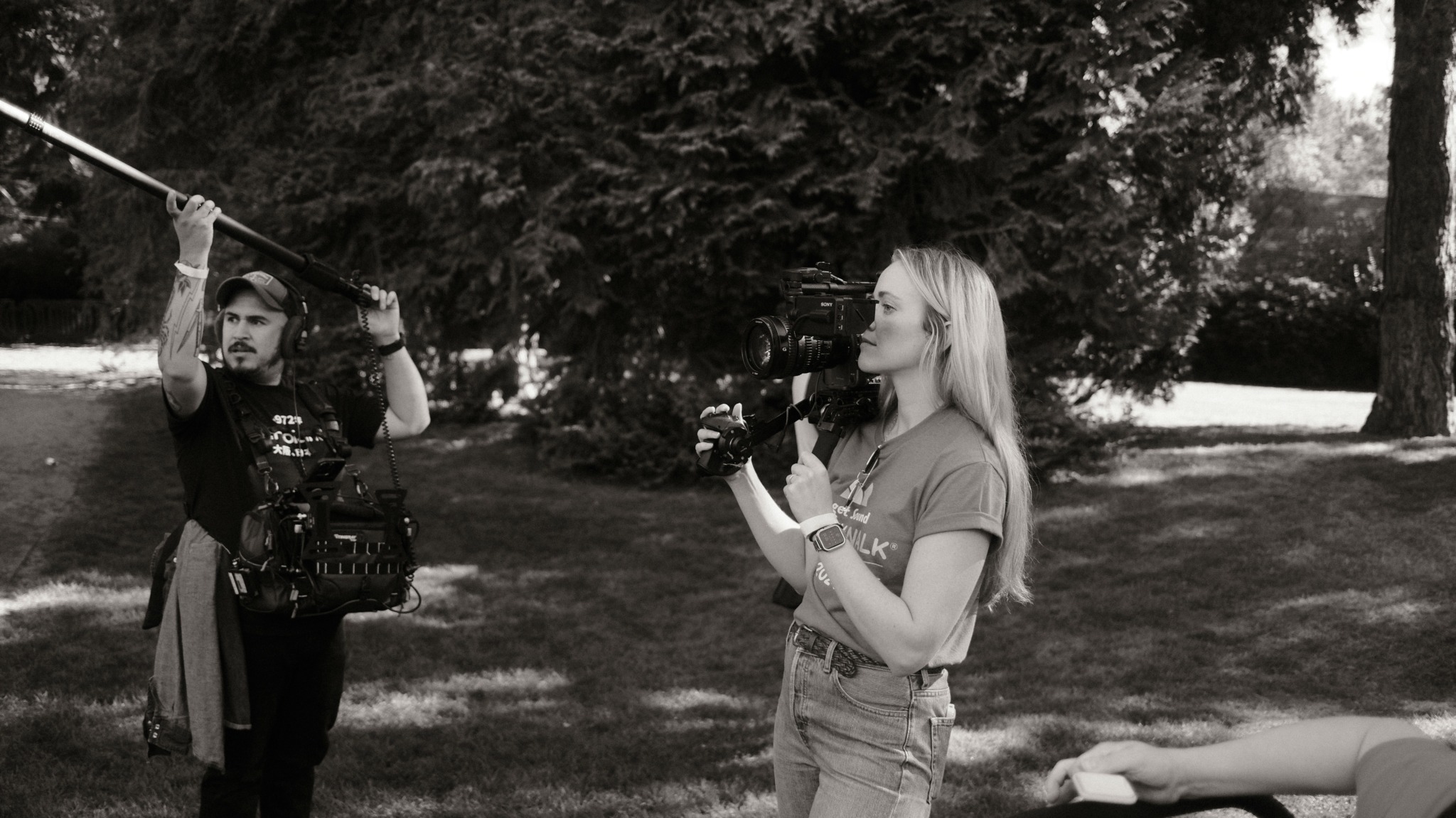Alright – so today we’ve got the honor of introducing you to Madeline Down. We think you’ll enjoy our conversation, we’ve shared it below.
Madeline, thanks for taking the time to share your stories with us today Can you talk to us about serving the underserved.
When I co-founded Studio89, my production company is Seattle, my partner and I were intentional about what we wanted this production company to be. That is, a space where people who historically aren’t in front of or behind the camera can thrive.
In practice, it became a mindful look at our slate. Like any business, we needed to balance the pursuit of clients that would help us bring in revenue, with stories that we’d like to take on – simply because it inspired us. As the production company was starting, I looked for documentary subjects for a passion project. I got connected with the Down Syndrome Center of Puget Sound and introduced to their Executive Director. Together, we identified the story of Matias, a (then) 5 y/o boy with Down syndrome in a culturally mixed family. With the DSC being a nonprofit entity, and my goal to use this short-documentary for festival submissions, we agreed to do this story for free. The short-doc earned the name ‘Downright Perfect’ from Matias’ mom and in August of 2024, one month after leaving my previous job to start this company, I started production on this short documentary.
While in production, I worked to find other clients – commercial or brand work that could also help sustain our business. Candidly, I was struggling to get clients past the finish line. A lot of conversations were pushed down the road or fizzled out. Until, I had a rough cut of a trailer for ‘Downright Perfect’. One of those conversations was with Special Olympics Washington. Rightfully so, it is a group that is specific about who they partner with, leaning toward hiring clients who have proven to work with IDD individuals, as it is important to get right. Once I shared the trailer for ‘Downright Perfect’, we landed two short-doc branded stories with Special Olympics, our first revenue of the production company.
Since, we have become a partner for storytelling with Special Olympics and have been referred to other nonprofits working with the IDD community. As we have grown in that storytelling space, I’m proud to say our slate is filled with telling stories about people often overlooked whether that be through disability, race, gender, sexual identity or otherwise.
I share this mostly to encourage people to do the following; build trust. Underserved communities are rightfully worried about people’s best intentions, especially in the filmmaking space as there is a history of these communities being taken advantage of for a shallow story. Being intentional about breaking into a new space often starts with the choice to work on discount, or in my case, free. However, if you can do it authentically, it will lead to business that also aligns with your personal goals.
‘Downright Perfect’ is now in its final post-production stage and will be on the festival circuit in the Summer of 2025.

As always, we appreciate you sharing your insights and we’ve got a few more questions for you, but before we get to all of that can you take a minute to introduce yourself and give our readers some of your back background and context?
I’m a filmmaker out of Seattle, WA dedicated to crafting authentic, emotionally resonant stories. With a foundation of trust and connection, my work aims to bridge the gap between storyteller and audience, emphasizing the power of raw, docu-style narratives. I have a background in sports production, which leans heavily toward a documentary style approach. I started as an editor, graduated to being a cinematographer and have played nearly every role in the production process since. Now, my dual first loves are directing & producing.
I lead a production company, Studio89, I co-founded with former Seahawk Doug Baldwin. Before starting this company, I spent seven years with the Seattle Seahawks, leading their production and game presentation departments. While there, I created the still-running show ‘The Sound of the Seahawks’, a docuseries with over 29M impressions across two seasons, and Season of Boom, a 10-part series celebrating the team’s Super Bowl-winning season with 13.2M impressions and 101,000 hours watched in the first four weeks after its premiere. I also produced and directed what Fanatics referred to as ‘the NFL’s most successful alternate jersey campaign of all time’, earning record-breaking engagement and sales for the Seahawks’ Throwback uniforms.
On the game presentation side, I spent seven seasons in the leading the live entertainment at home games for 69,000 fans. From scripting on-field moments (like a Steve Aoki Thanksgiving halftime show), to calling live cameras and replays, the control room at Lumen Field became my home.
I’ve been lucky to be celebrated at over 25 film festivals globally, earning four NW Emmys, 2 Bronze CLIOs and a “Best Cinematographer” at the 2024 PNW Indie Awards. Whether creating high-stakes live productions or intimate indie films, my work prioritizes emotional depth, hopefully leaving audiences with lasting memories.
Since starting Studio89 in July of 2024, I’m proud to say we are achieving a balance of branded work and film work that I’m very proud of. In 2025, we will be completing production work with companies like Special Olympics, ZGiRLS, Sound Generations, Pioneer Human Services, National Hot Rod Association, 988 Suicide Prevention Hotline and more. Our slate also consists of supporting independent filmmaking, through documentary and narrative projects. We will be sharing our first narrative production under the Studio89 name, SENSE OF EMERGENCY, on the festival circuit this Summer. I wrote, directed and produced this short, and am very excited to have it be Studio89’s debut in the narrative space.
I am currently working in development on four other film projects, looking to build the narrative slate at Studio89 looking toward 2026. Ultimately, I’d love for Studio89 to be a resources for film in the Pacific Northwest, while continuing to tell branded stories that focus on underrepresented communities and people.
Outside of production work, I like spending time with my wife, Haley and our dachshund Ricky. I also spend way too much time talking about tv and movies I love, most recently the show ‘Severance’.

Can you tell us about a time you’ve had to pivot?
Last Summer, I made the decision to leave my role at the Seattle Seahawks leading their production and game presentation groups, to start my production company Studio89.
As ridiculous as this sounds, it was terrifying. I started at the Seahawks when I was 22-years-old. I became a professional there, candidly I feel I grew up there. And that company let me do that. In the seven years I was there, I grew into a role that had never existed before, through carving out with my peers and superiors opportunity. It was a place that rewarded someone choosing to try something and it was the perfect place to cut my teeth on the grueling side of production.
But, ultimately, sports was never my first love – production was. And, when you work for a team in the capacity I was, I was spending a lot of time not doing what I loved, but more of what I liked…in order to square peg/round hole into something I loved. I created docuseries in order to direct. I wrote commercials in order to write. I begged for access in order to shoot. It was all in service of my ultimate love, production. My weeks were routinely 60 hours, traveling every weekend, without a day off sometimes for months at a time.
So, when my now cofounder Doug Baldwin reached out to me with the opportunity of what I like to call an ‘entrepreneur’s soft landing’, it felt time. Simply because, I didn’t have any time. I did an evaluation of how I was spending those 60-hour weeks. At most, I was doing what I loved 60% of the time, and only in the margins – so often in the 7PM-10PM windows. I was sacrificing so much of my personal life in order to reach 60% contentment. How much could I accomplish if I spent those 60 hours actually pursuing what I loved, 100% of the time? I was at a point in my career where I could take a leap. I’m healthy, I don’t have dependents, I have an incredibly supportive partner, what was stopping me? Logically, I knew that. Emotionally, it meant saying goodbye to a group of people I had led or pulled to that organization, that was the hardest calculation. I loved my teams and the people I spent those hours upon hours with, on sidelines and in control rooms around the country. But ultimately, the decision needed to be about me and my career. So I put myself first. I don’t regret it.

How do you keep your team’s morale high?
In film and in any creative pursuit, you’re only as strong as your team and it’s morale. Period. I put a huge emphasis on this, because I believe it to my core.
I found there are a few core truths of how to earn the respect of people you manage.
1. Never ask anyone to do anything you wouldn’t do yourself. And prove it. I follow this rule religiously (and probably to a fault at times). This ranges from menial tasks to highly technical pursuits. You don’t need to be better at the task than the collaborator your asking to perform it, but knowing how to speak to it shows ultimate respect.
2. Language matters, inclusive language makes all the difference. Especially in the creative world, I find ownership is something that often hurts feelings. I make it a point to give credit where credit is due and also describe our work as OURS. I have also never referred to an ’employee’ as that. They are always my coworker, my collaborator. As their leader, it is important to me that they see I value them and their role in this project as much (or often more) as I value mine. That is shown day after day and often in simple language choices.
3. Create a diverse team. I mean this in every sense – ability, age, race, gender, religion, etc. This will serve a few purposes, the first being that everyone is safe and can feeling belonging in this environment. I find as you diversify your team, it only cements how much trust you have from each individual. It also provides a space where new ideas and ways of working are inherent to the experience. Each individual walks away from that team with a new idea, way of doing things or thinking. That builds trust and devotion to the team far more than people realize.
4. Make it theirs. In every project I work on with others, I emphasize that I want them to find something that they connect to and have the freedom to make it theirs. And I mean it. I always select 2-3 items about the project I’d like to stay within my vision. Everything else? Fair game. If one of my collaborators has an idea of how to change something and are passionate about it? Hell yes. If they make it theirs, not only will it increase morale, the entire project will be better for it.
Contact Info:
- Website: madelinedown.com & studio89.com
- Instagram: @madelinedown
- Linkedin: https://www.linkedin.com/in/madelinedown/
- Twitter: @madeline_down
- Other: Our film has an instagram as well that I’d love to advertise. Its @senseofemergency






Image Credits
Photographer: Rod Mar


